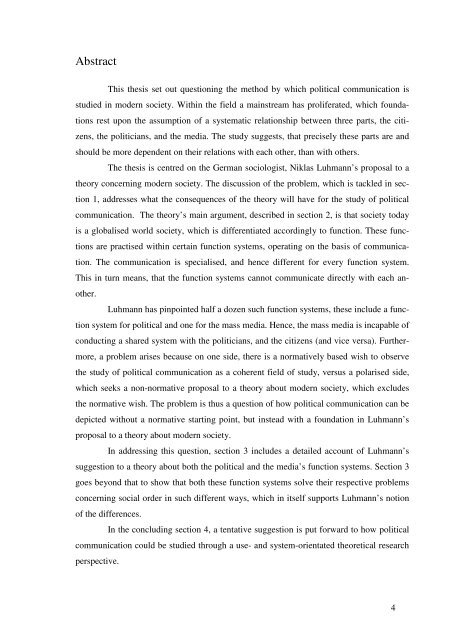Politisk kommunikation og Luhmann
Create successful ePaper yourself
Turn your PDF publications into a flip-book with our unique Google optimized e-Paper software.
Abstract<br />
This thesis set out questioning the method by which political communication is<br />
studied in modern society. Within the field a mainstream has proliferated, which foundations<br />
rest upon the assumption of a systematic relationship between three parts, the citizens,<br />
the politicians, and the media. The study suggests, that precisely these parts are and<br />
should be more dependent on their relations with each other, than with others.<br />
The thesis is centred on the German sociol<strong>og</strong>ist, Niklas <strong>Luhmann</strong>’s proposal to a<br />
theory concerning modern society. The discussion of the problem, which is tackled in section<br />
1, addresses what the consequences of the theory will have for the study of political<br />
communication. The theory’s main argument, described in section 2, is that society today<br />
is a globalised world society, which is differentiated accordingly to function. These functions<br />
are practised within certain function systems, operating on the basis of communication.<br />
The communication is specialised, and hence different for every function system.<br />
This in turn means, that the function systems cannot communicate directly with each another.<br />
<strong>Luhmann</strong> has pinpointed half a dozen such function systems, these include a function<br />
system for political and one for the mass media. Hence, the mass media is incapable of<br />
conducting a shared system with the politicians, and the citizens (and vice versa). Furthermore,<br />
a problem arises because on one side, there is a normatively based wish to observe<br />
the study of political communication as a coherent field of study, versus a polarised side,<br />
which seeks a non-normative proposal to a theory about modern society, which excludes<br />
the normative wish. The problem is thus a question of how political communication can be<br />
depicted without a normative starting point, but instead with a foundation in <strong>Luhmann</strong>’s<br />
proposal to a theory about modern society.<br />
In addressing this question, section 3 includes a detailed account of <strong>Luhmann</strong>’s<br />
suggestion to a theory about both the political and the media’s function systems. Section 3<br />
goes beyond that to show that both these function systems solve their respective problems<br />
concerning social order in such different ways, which in itself supports <strong>Luhmann</strong>’s notion<br />
of the differences.<br />
In the concluding section 4, a tentative suggestion is put forward to how political<br />
communication could be studied through a use- and system-orientated theoretical research<br />
perspective.<br />
4



